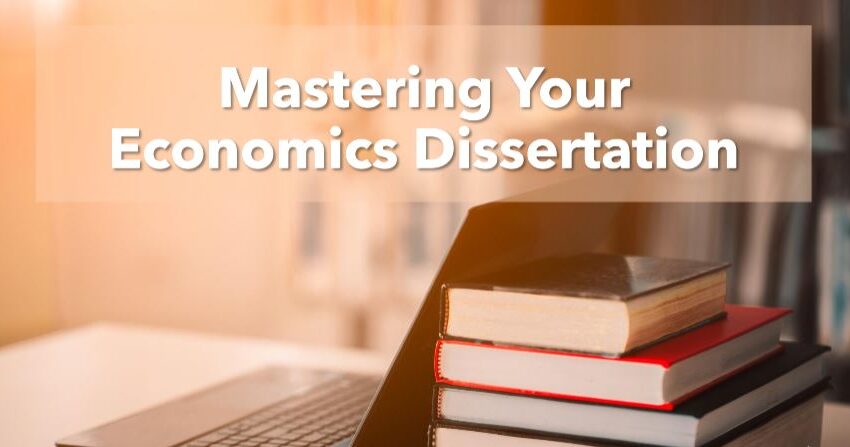It’s not just about demonstrating your proficiency in economic theories and concepts; it’s about significantly contributing to the field. However, the path to dissertation success is laden with challenges, and many students need expert guidance. That’s where we come in. This comprehensive guide will unveil the expert tips and tricks to help you master your economics dissertation help. Whether you’re just starting or stuck in the middle of your research, this article will serve as your ultimate resource.
Understanding the Significance
Before diving into the intricacies of writing an outstanding economics dissertation, it’s crucial to grasp the significance of this academic endeavor. A dissertation is more than just a requirement for obtaining your degree; it’s your opportunity to delve deep into a specific economic topic, contribute to the existing body of knowledge, and showcase your analytical and research skills.
Selecting the Perfect Topic
The cornerstone of any exceptional dissertation lies in choosing the right topic. Your topic should be relevant, engaging, and capable of sustaining your interest throughout the research process. Here’s how to do it:
Conduct In-depth Research
To find the perfect topic, scour through academic journals, textbooks, and recent publications in economics. Identify gaps in the current literature or areas that require further exploration. Your topic should ideally address these gaps.
Consult Your Advisor
Your academic advisor is a treasure trove of knowledge and experience. Consult with them to refine your research idea. They can provide valuable insights, suggest modifications, and guide you toward a topic that aligns with your interests and the academic landscape.
Crafting a Robust Research Proposal
Once you’ve settled on a topic, it’s time to create a compelling research proposal. This document serves as a roadmap for your dissertation and helps you gain approval from your faculty. A well-structured research proposal should include:
Research Objectives
Clearly outline the objectives of your study. What do you intend to achieve with your research, and why is it important?
Literature Review
Conduct an exhaustive review of existing literature related to your topic. Highlight the key theories, concepts, and research findings that inform your study.
Methodology
Explain the research methods and tools you plan to use. Justify your choices and discuss how they align with your research objectives.
Timeline
Create a realistic timeline that outlines the various stages of your dissertation, from research to writing and editing.
Data Collection and Analysis
The heart of your economics dissertation lies in data collection and analysis. Here’s how to excel in this crucial phase:
Primary and Secondary Sources
Depending on your research question, you may need to collect primary data through surveys, interviews, or experiments. Use secondary sources like government reports, academic papers, and datasets.
Rigorous Analysis
Apply statistical and econometric techniques to analyze your data effectively. Ensure that your analysis is robust and aligns with your research objectives.
Structuring Your Dissertation
The structure of your dissertation plays a pivotal role in its readability and impact. Follow this tried-and-tested structure:
Introduction
Provide a clear introduction to your topic, research question, and objectives. Engage your readers and explain why your research is essential.
Literature Review
Incorporate a comprehensive literature review that highlights relevant theories and empirical studies. Identify gaps in the existing literature and explain how your research fills these gaps.
Methodology
Detail your research methods, data collection procedures, and analytical techniques. Justify your choices and discuss any limitations.
Results
Present your research findings in a clear and organized manner. Use tables, charts, and graphs to enhance the presentation of your results.
Discussion
Interpret your findings and discuss their implications. Relate your research to the existing literature and address any unexpected results.
Conclusion
Summarize your key findings, restate your research question, and emphasize the significance of your economics research.
The Importance of Editing and Proofreading
A well-written dissertation is not just about the content but also the presentation. Before submitting your work, invest ample time in editing and proofreading. Here’s why it matters:
Clarity and Cohesion
Ensure that your dissertation flows smoothly from one section to another. Check for clarity in your writing and maintain consistency in terminology and formatting.
Grammar and Style
Eliminate grammatical errors and refine your writing style. A polished dissertation reflects professionalism and attention to detail.
Citation and Referencing
Adhere to the citation style recommended by your institution. Properly cite all sources to avoid plagiarism and give credit to the original authors.
Seeking Expert Guidance
If you are stuck or need guidance during your dissertation journey, seek expert help. Many reputable services offer economics dissertation assistance, including topic selection, data analysis, and editing.
In conclusion, mastering your economics dissertation is a challenging yet rewarding endeavor. By selecting the perfect topic, crafting a robust research proposal, excelling in data collection and analysis, structuring your dissertation effectively, and ensuring impeccable editing and proofreading, you can create a dissertation that meets academic standards and contributes significantly to economics. Remember, dedication, meticulous research, and a commitment to excellence are the keys to success.
